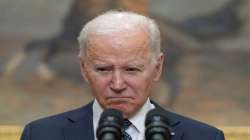'Russian invasion of Ukraine is beginning,' says Biden, announces sanctions against Moscow, its elites
US President Joe Biden announced that they are ordering heavy financial sanctions against Russian banks and oligarchs, declaring that Moscow had flagrantly violated international law in what he called the “beginning of a Russian invasion of Ukraine.”

United States President Joe Biden on early Wednesday announced sanctions on Russia following Moscow's unilateral moves to recongnise independence of rebel regions in Ukraine, saying an 'invasion of Ukraine is beginning'. Washington's sanction move against Moscow was followed UK and Germany.
Biden announced the U.S. was ordering heavy financial sanctions against Russian banks and oligarchs, declaring that Moscow had flagrantly violated international law in what he called the “beginning of a Russian invasion of Ukraine.”
“None of us will be fooled” by Russian President Vladimir Putin’s claims about Ukraine, the U.S. President said adding more sanctions could be on the way if Putin proceeds further.
Biden said he was also moving additional U.S. troops to the Baltic states on NATO’s eastern flank bordering Russia.
Biden joined the 27 European Union members who unanimously agreed on Tuesday to levy their own initial set of sanctions targeting Russian officials over their actions in Ukraine.
Russian Upper House allows Putin to use army outside country
Russian lawmakers on Tuesday authorized President Vladimir Putin to use military force outside the country — a move that could presage a broader attack on Ukraine after the U.S. said an invasion was already underway there.
Several European leaders said Russian troops rolled into rebel-held areas in eastern Ukraine after Putin recognized their independence.
But it was unclear how large the deployment was, and Ukraine and its Western allies have long said Russian troops were fighting in the region, allegations that Moscow always denied.
Members of Russia’s upper house, the Federation Council, voted unanimously to allow Putin to use military force outside the country — effectively formalizing a Russian military deployment to the rebel regions, where an eight-year conflict has killed nearly 14,000 people.
Shortly after, Putin laid out three conditions to end the crisis that has threatened to plunge Europe back into war, raising the specter of massive casualties, energy shortages across the continent and economic chaos around the globe.
Putin said the crisis could be resolved if Kyiv recognizes Russia’s sovereignty over Crimea, the Black Sea peninsula that Moscow annexed from Ukraine in 2014, renounces its bid to join NATO and partially demilitarizes. The West has decried the annexation of Crimea as a violation of international law and has previously flatly rejected permanently barring Ukraine from NATO.
Asked whether he has sent any Russian troops into Ukraine and how far they could go, Putin responded, “I haven’t said that the troops will go there right now.” He added coyly that “it’s impossible to forecast a specific pattern of action –- it will depend on a concrete situation as it takes shape on the ground.”
Germany made the first move against Russia
Biden scheduled an address for later Tuesday, but Germany made the first big move. It took steps to halt the process of certifying the Nord Stream 2 gas pipeline from Russia — a lucrative deal long sought by Moscow but criticized by the U.S. for increasing Europe’s reliance on Russian energy. READ MORE
The rest of the European Union soon followed, with a first set of sanctions aimed at the 351 Russian lawmakers who voted for recognizing separatist regions in Ukraine, as well as 27 other Russian officials and institutions from the defense and banking world. They also sought to limit Moscow’s access to EU capital and financial markets.
With tensions rising and a broader conflict looking more likely, the White House began referring to the Russian deployments in the region known as the Donbas as an “invasion” after initially hesitating to use the term — a red line that President Joe Biden has said would result in the U.S. levying severe sanctions against Moscow.
“We think this is, yes, the beginning of an invasion, Russia’s latest invasion into Ukraine,” said Jon Finer, principal deputy national security adviser, said on CNN. “An invasion is an invasion, and that is what is underway.”
(With inputs from AP)
ALSO READ | EXPLAINER: A look at toughest US sanctions facing Russia
ALSO READ | World leaders focus on how to punish Russia over Ukraine